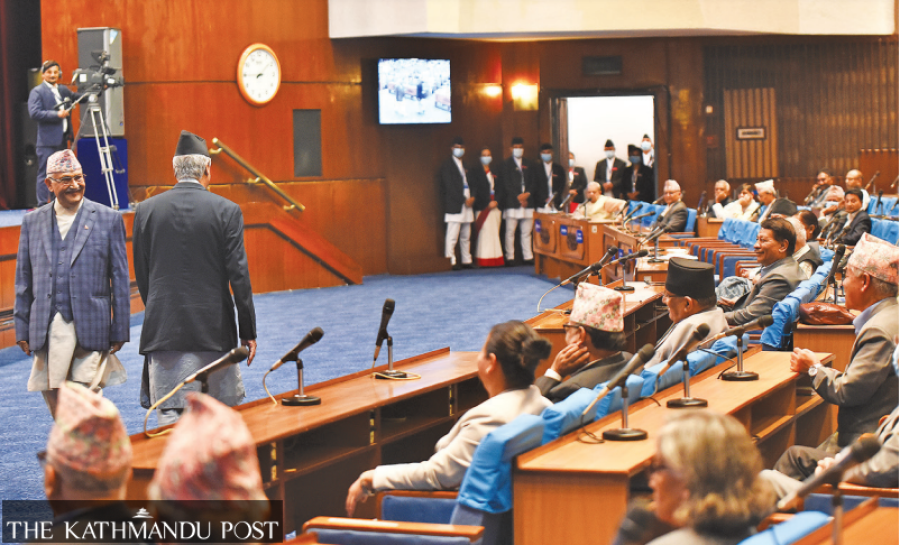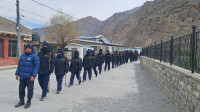Politics
Mud-slinging the order of the day in Parliament’s last sitting
House debates were largely centered on removal of Oli government and the citizenship issue.
Nishan Khatiwada
Top leaders of Nepal’s parliamentary parties spent most of Saturday heaping blame on each other before the tenure of the House of Representatives ended at midnight the same day.
Addressing the federal House meeting, Prime Minister and Nepali Congress President Sher Bahadur Deuba satirically said the mandamus order (Paramadesh) issued by the Supreme Court had made the meeting with KP Sharma Oli, the main opposition leader, in the parliament possible.
“Our opposition party calls us ‘the government formed by the mandamus’. Had there been no mandamus, we could not have worked together. Nor could we have endorsed vital bills,” he said.
In July last year, Deuba had replaced Oli as prime minister following the Supreme Court order.
According to Deuba, the mandamus saved the House from Oli’s efforts to dissolve it. In the meeting, he also called for everyone’s support to successfully hold the upcoming polls.
Deuba pledged the government’s full support to the Election Commission for the same.
Oli, on the other hand, criticised Deuba’s appointment as prime minister. Speaking in the House, he said, “Where does the constitution state that the right to remove and appoint a prime minister should be exercised from ‘somewhere else’?”
While Oli defended his twin House dissolutions, other political parties leaders termed them unconstitutional.
“How is calling for an election a regression (pratigaman)? The constitution’s Article 76 clearly says if all the options have been exhausted, elections should be conducted in six months,” Oli said. “Regression is rather the formation of a dubious government via an unconstitutional process.”
Speaking at the meeting, CPN Maoist Centre Chairman Pushpa Kamal Dahal reminded everyone that the constitution clearly mentions that the House cannot be constitutionally dissolved so long as there is a chance of new government formation from within the House. “Is dissolving the Parliament by defying constitutional and democratic values, despite a clear possibility of government formation, not a regression?” he questioned.
Janata Samajbadi Party chair Upendra Yadav mocked Oli, saying his government has a checkered history of unconstitutionally dissolving the House.
Senior CPN (Unified Socialist) leader Jhala Nath Khanal said the safeguards against House dissolution had been carefully inserted in the constitution.
Future prime ministers don’t have the right to dissolve the House as well, Khanal said. “Is it not unconstitutional for someone to claim that dissolution is their right?”
After Oli lamented about not being allowed to work properly during his government leadership, Khanal asked, “What work did he want to do exactly?”
Khanal added that the coalition’s formation had protected the constitution. “Had we not saved the House, he [Oli] would not have been able to give speeches here today.”
Dahal added that Oli had crossed the line by comparing the upcoming polls with what he did earlier. “Does the main opposition leader believe Nepali people know nothing?” he said. “The coalition was formed mainly to correct the unconstitutional moves of the Oli government.”
Competing top leaders also lashed out at each other over the issue of citizenship.
Speaker Agni Sapkota had returned the bill to amend the Citizenship Act to the President’s Office on September 5 after both the Houses passed it for the second time without any changes.
“During our time in government, we tried to sort out citizenship problems through an ordinance, but were prevented from doing so without a reason,” said UML chair Oli. “It is obvious to bring an ordinance when the House is not sitting. Now politics again dominates the citizenship debate.”
Dahal for his part further accused Oli of lending a deaf ear when he was asked to take the citizenship issue to the House during his time as prime minister. “But later he brought an ordinance on the same after dissolving Parliament.”
The ordinance brought by Oli on citizenship was aimed only at tricking Madhes-based parties, said Yadav, the Janata Samajbadi chair. “Back then, the President endorsed it without any hesitation and now she is reluctant [to approve the new House bill]. This is a mockery of constitutional norms.”
“Big parties have ruled with a colonial mindset. They consider people as their servants. How will people get justice?” asked Rajendra Mahato, a Loktantrik Samajbadi Party leader.
“On citizenship, two big parties are creating hurdles for each other, whether they are in the government or in the opposition.”
At the meeting, Oli also blamed the ruling coalition for slow development works and failing to sort out national problems. “People will give their verdict on the government and the coalition in the November polls,” he said.
Replying to Oli, Dahal said, “Oli wants us to look ahead to the November polls. I want to remind him about the message of the National Assembly elections.”
In the National Assembly elections in January this year, the UML had gotten only one of the 19 contested seats.
Oli further blamed the ruling coalition for misusing power in the last local elections.
“I want to warn the government that such activities contravene democratic values. In a democracy, the competition should be pure,” he said.
Khanal, senior leader of CPN (Unified Socialist), charged Oli with inaugurating projects without planning, budget and detailed reports.
“Is development work only for showing?” The Oli-led government was not a government of political parties but one solely of the government head, he said.
Mahato said both the current prime minister and the main opposition chair claim that everything they had done is right and each did their best to implement the constitution. “The question is: Are the Nepali people satisfied or not?”




 23.39°C Kathmandu
23.39°C Kathmandu















